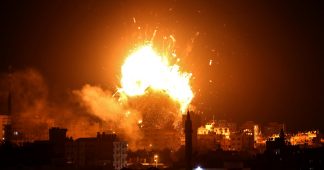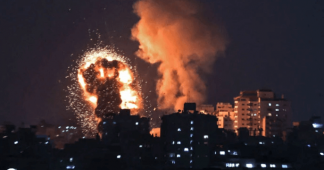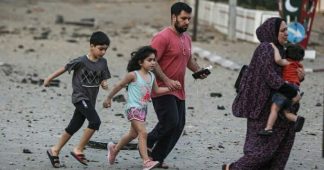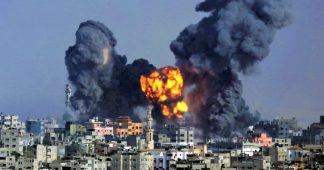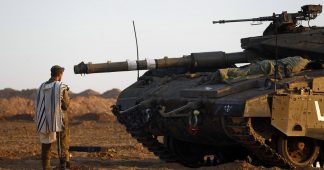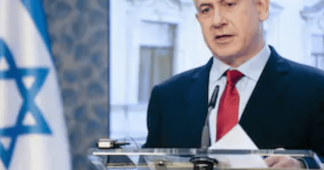By
14 May 2021
Israel pounded the Gaza Strip for the fourth consecutive day on Thursday, with the health ministry in the territory reporting more than 100 killed in the most severe military offensive there since 2014.
Palestinian armed groups in Gaza continued to retaliate by firing projectiles towards Israel. Seven people, including a soldier and two children, have been killed in rocket strikes in Israel since Monday.
Palestinians in the territory reported unprecedented Israeli fire at the close of Thursday – which marked the Eid al-Fitr holiday at the end of Ramadan – particularly in the northern Beit Hanoun area and eastern Gaza. Families displaced from their homes sought shelter at United Nations schools.
In the Gaza Strip, Palestinians are saying goodbye all over social media, expecting to be hit and killed by Israel's heavy shellings any moment now. Israel's attacks against Gaza must be brought to an end. #GazaUnderAttack #EndImpunity
— Al-Haq الحق (@alhaq_org) May 13, 2021
Gaza, which has been under a comprehensive land, air and sea blockade imposed by Israel since 2007, has no bomb shelters and civilians are unable to freely leave the territory for safety.
The Israeli military said it was attacking Gaza with both ground forces and airstrikes after it had amassed tanks along the perimeter of the besieged territory and called up thousands of army reservists, setting the stage for a potential ground invasion.
The spokesperson for the Qassam Brigades, the armed wing of Hamas, said late Thursday that Israel was “launching raids for show” and that “they will not affect the capabilities of the resistance one iota, God willing.”
Palestinian rocket fire caused international airlines to cancel flights to Israel just as the country was celebrating its reopening after its COVID-19 vaccine rollout.
Israel’s military reportedly admitted in closed-door meetings that it had underestimated the rate with which Hamas was able to fire rockets and their range capacity.
Netanyahu threatens military against Palestinians in Israel
Meanwhile, mobs of ultranationalist Israelis backed by police attacked Palestinians in Jerusalem and in cities in Israel where Palestinian citizens of the state live in close proximity to Jews.
A state of emergency had been declared in Lydd, a Palestinian city in Israel that has been engulfed in violence since Monday when a Palestinian man was shot and killed by a Jewish vigilante during riots.
Benjamin Netanyahu, Israel’s prime minister, was reportedly considering deployment of the military and permitting the use of administrative detention without charge or trial in cities where a state of emergency has been declared.
Such a directive would with all certainty be applied with disproportionate force and in a highly discriminatory manner by the state, which has “Jewish supremacy” as its “single organizing principle,” in the words of the Israeli human rights group B’Tselem.
Netanyahu told forces deployed into Palestinian communities in Israel to use as much force as possible and to not worry about being held accountable for their actions:
Netanyahu on live TV declares deployment of military forces, including militarized border police, into Israeli towns with clear order to use as much force as possible to restore law and order. He says security forces shouldn’t worry about investigations or commissions of inquiry. https://t.co/JNlNRXMSEr
— Jamil Dakwar (@jdakwar) May 13, 2021
Israel’s defense minister Benny Gantz ordered a massive deployment of paramilitary Border Police forces, who typically operate in the occupied West Bank and, like army soldiers, use disproportionate and frequently lethal force against Palestinians.
In a pre-recorded video address on Tuesday, Gantz promised even worse violence than that endured in Gaza in 2014, when he was chief of the Israeli military.
“If citizens of Israel have to sleep in shelters, then Gaza will burn,” he said.
Fatou Bensouda, the chief prosecutor of the International Criminal Court, confirmed this week that the justice tribunal was moving forward with its Palestine investigation despite the lack of participation by Israel.
Israel’s assault on Gaza in summer 2014, including the conduct of armed Palestinian groups, is a primary focus of the ICC’s investigation.
Bensouda said that individuals involved in the current escalation may be investigated.
“Green light to commit crimes”
Al Mezan, a Palestinian human rights group in Gaza, decried the silence of the “international community” which Israel interprets “as a green light to commit crimes against civilians and their property.”
Al Mezan said that 14 resistance fighters targeted by Israeli warplanes on Wednesday morning died as a result of suffocation, with apparent symptoms indicating the possible use of toxic gasses.
Twenty-eight children and 15 women were amongst the dead in Gaza, the health ministry said late Thursday. More than 600 have been injured.
Like in 2014, Israel’s military has targeted several multi-story residential and office buildings, wiping out a tower that housed multiple local and international media outlets.
Israeli bombing has destroyed or severely damaged more than 18 buildings and 350 housing units in Gaza since Monday, displacing some 500 families.
“Seven factories, eight schools and a health center have also been damaged by Israeli airstrikes and shortfalls of Hamas-launched rockets,” the United Nations monitoring group OCHA reported on Thursday.
“In addition, scores of military sites, police and security facilities, as well as open areas, have been hit, with the police headquarters in Gaza City destroyed,” OCHA added.
UNRWA, the UN agency for Palestine refugees, said at least four of its buildings in Gaza had been hit.
“It is unclear whether the UNRWA buildings were hit directly or whether the strikes were so close that the buildings were impacted. All staff are reported to be safe and well,” the agency stated.
The already dire humanitarian situation in Gaza has been exacerbated as Israel has prevented the entry of fuel, food and supplies of medicine. Gaza’s sole power plant will stop operating at the end of the week when fuel supplies are exhausted.
“The North Gaza Seawater Desalination Plant has stopped operating due to the risk to workers and a damaged electrical supply line, affecting the access of about 250,000 people to drinking water,” according to OCHA. Meanwhile, some 160,000 people in Gaza City have limited access to running water due to power cuts.
“The current insecurity significantly restricts the delivery of essential services, including the ongoing COVID-19 response, with the number of tests conducted drastically reduced and people unable to access treatment and vaccination facilities safely,” OCHA added.
The full-scale military escalation came after Israeli police stormed Jerusalem’s al-Aqsa mosque while it was filled with Ramadan worshippers on Monday, injuring hundreds. This followed weeks of tension in the city and protests over the imminent forced evictions of Palestinian families in the Sheikh Jarrah neighborhood to make way for Jewish settlers.
A Gaza ceasefire did not appear on the immediate horizon early Friday.
US President Joe Biden gave his implicit blessing of Israel’s targeting of residential towers and other civilian infrastructure, telling reporters that he had not seen a “significant overreaction” from Israel.
The Biden administration has stated that it supports Israel’s “right to self-defense” but it does not consider rockets fired from Gaza to constitute self-defense.
The UN Security Council is due to hold a virtual public meeting over the deteriorating situation on Sunday.
The US, which provides $3.8 billion in military aid to Israel each year, has prevented the Security Council from issuing a statement on the worsening violence.
Published atelectronicintifada.net
Also read
Thousands flee homes as Israel continues air raids on Gaza: Live
